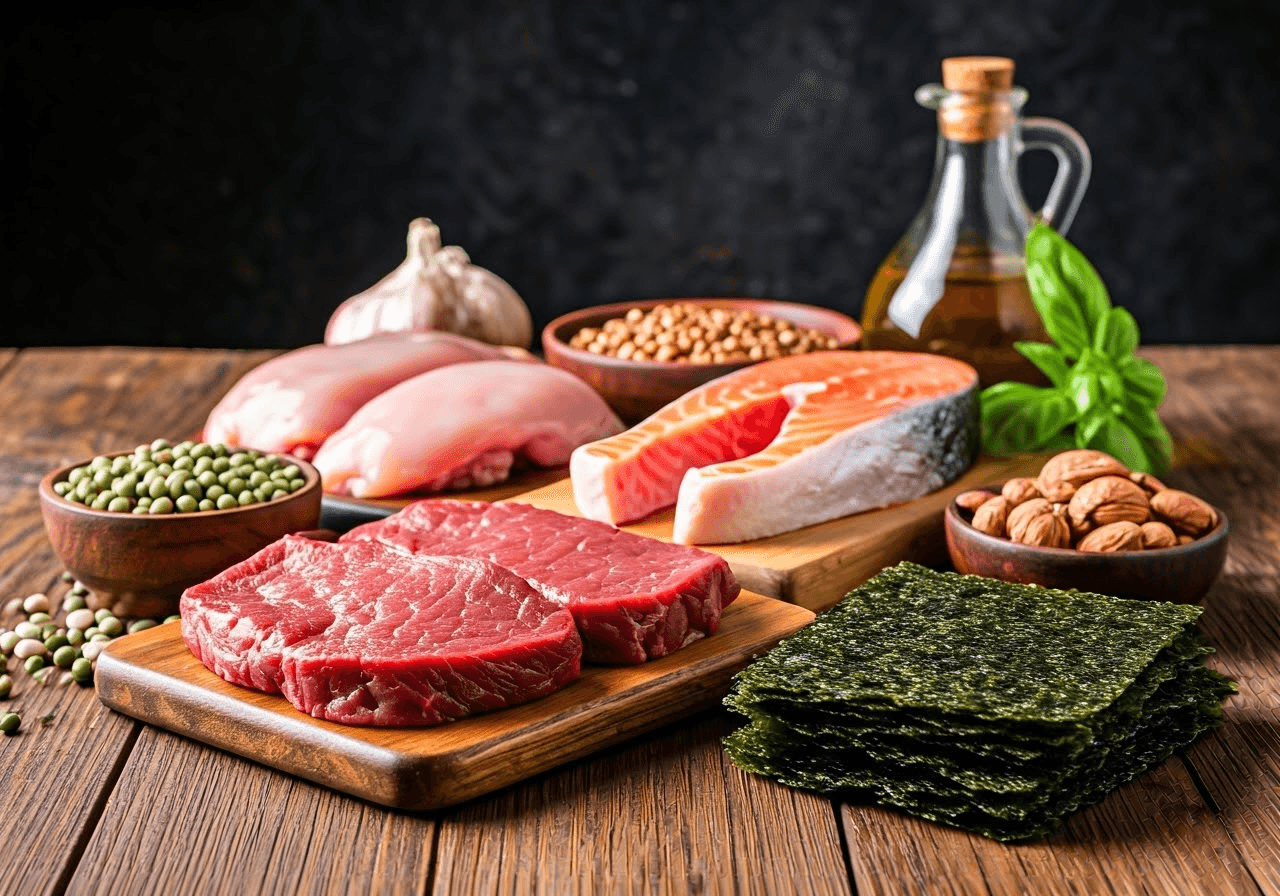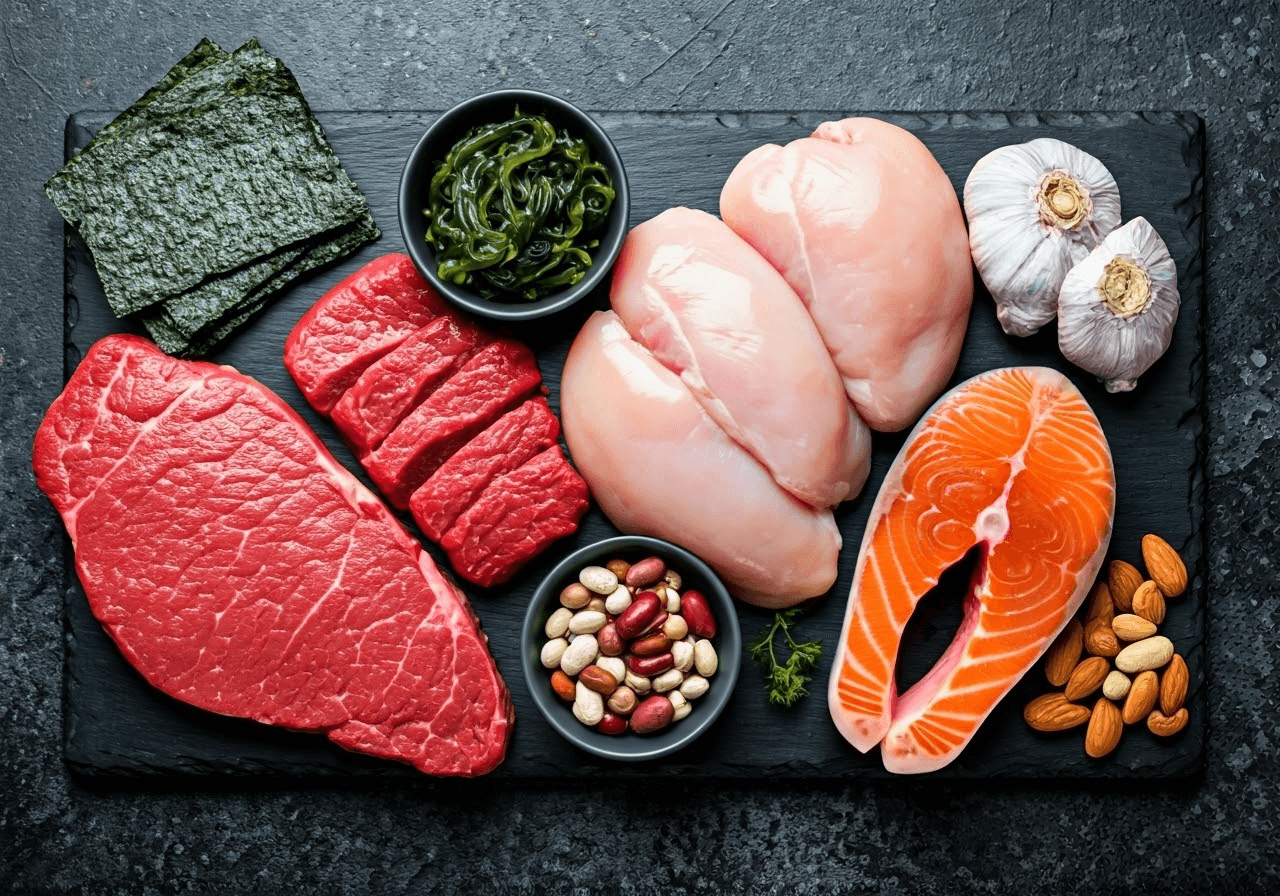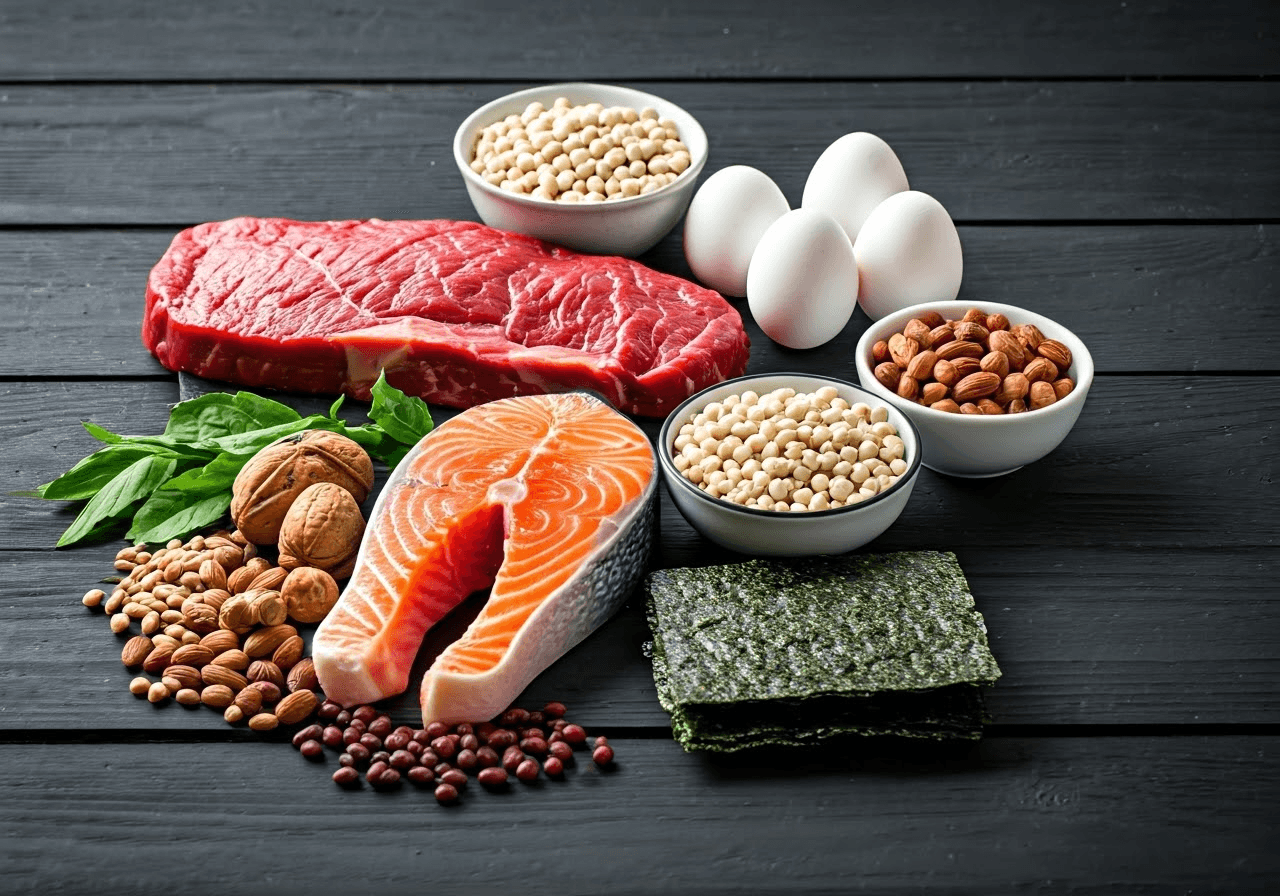
Introduction
Taurine is an amino acid that many people overlook. It is important for keeping a healthy central nervous system. Often found in energy drinks, taurine does much more than just give you energy. This amazing amino acid has many health benefits, making it an important part of a balanced and healthy lifestyle.
Understanding Taurine and Why It Matters
In the field of nutrition and health, taurine usually doesn’t get as much attention as other vitamins and minerals, including vitamin E. Still, this lesser-known amino acid is very important for our overall well-being and energy.
Taurine plays a role in many body functions. It helps our heart, nervous system, and muscles work properly. By learning about taurine and adding it to our meals, we can make better choices for our health.
What is Taurine?
Taurine is often wrongly called a “regular” essential amino acid, but it is different. It is a unique compound with special traits. Unlike other amino acids that build proteins, taurine acts as a free amino acid. This means it works alone in our bodies, performing important functions.
Taurine was found and separated from ox bile in the 1800s. Its name comes from the Latin word “taurus,” which means bull. This shows that taurine was first discovered in animal sources.
Today, we see taurine not only in animal products but also in some types of algae. Its many roles in the body have caught the interest of researchers. They keep studying taurine to learn more about its health benefits.
Chemical Structure and Properties
At its core, taurine is an amino acid that contains sulfur. This feature sets it apart from many other amino acids. It is classified as a beta-amino acid because of the special placement of its amino group.
What makes taurine unique is that it has a sulfonic acid group. This group is not found in regular amino acids, which usually have a carboxylic acid group. This different structure gives taurine special traits in the body.
The sulfonic acid group helps taurine be very stable across different pH levels. This means it can work well in many areas of the body. This stability allows taurine to act as both an acid and a base. Because of this, taurine can take part in many important processes, affecting things like nerve signals and heart muscle activity.
How Taurine Differs from Other Amino Acids
Unlike most amino acids that join together to make proteins, taurine acts differently. It does not help in building proteins. Instead, taurine stays in a free form, ready to do many other jobs in the body.
You can think of taurine as a handy tool in the body’s workshop. It does special tasks that other amino acids that are part of proteins can’t do.
Taurine helps regulate heart rhythm and nerve signals. It also protects cells from damage. Its jobs go beyond just building proteins. This shows how important taurine is in keeping us healthy.
Table: Taurine vs. Other Amino Acids
Feature | Taurine | Typical Amino Acids |
|---|---|---|
Role in the Body | Free-form, regulates cell functions | Builds proteins |
Chemical Group | Sulfonic acid group | Carboxylic acid group |
Protein Formation | Does not form proteins | Forms proteins |
Functions | Antioxidant, neurotransmitter, heart health | Muscle building, tissue repair |
Daily Recommended Intake of Taurine
While the human body can produce small amounts of taurine, primarily in the liver, it’s considered a “conditionally essential” nutrient. This means that under certain circumstances, like during infancy or periods of illness, our bodies may require more taurine than we can produce internally.
Currently, there is no officially established Recommended Daily Allowance (RDA) for taurine. However, typical daily intakes vary based on factors such as diet and overall health.
Below is a general guideline:
Age Group | Estimated Daily Intake (mg) | Notes |
|---|---|---|
Adults | 40-400 | Varies by diet and health status |
Pregnant Women | May require higher amounts | Consult a doctor for personalized advice |
Children | Consult with a pediatrician | No official guidelines |
It’s always advisable to consult with a healthcare professional to determine your individual needs.
Natural and Dietary Sources of Taurine

Taurine is not only in energy drinks, as some people think. It naturally occurs in many foods, especially ones from animals. If you want to boost your taurine levels through your diet, picking certain types of food can help.
Taurine supplements are also an easy way to get more if you don’t eat enough taurine-rich foods. Knowing the benefits and downsides of both food sources and supplements can help you make better choices.
Taurine in Animal-Based Foods
If you love seafood, you’re in a great place! Fish and shellfish are some of the best sources of taurine. These ocean treats give a good amount of this important amino acid.
Meat lovers can also be happy. Beef, dark meat from poultry, and other animal products add a lot to taurine intake. Including these protein foods in a balanced diet can help you get enough taurine levels.
But remember, the taurine content in animal products can change. This is based on things like the animal’s diet and the type of meat. Choosing lean cuts and eating seafood and poultry more often can increase your taurine intake while keeping saturated fat lower.
Plant Sources and Their Taurine Content
Taurine is found in some plant-based foods, but not as much as in animal sources. Typical taurine consumption is important for people who follow a vegan or vegetarian diet to know where to find it.
Seaweed is one of the best plant-based sources. It has a surprisingly high taurine content, especially nori, the type of seaweed used in sushi rolls.
Some legumes and nuts also have small amounts of taurine. By adding a range of these plant-based foods into your meals, you can improve your taurine intake.
Table: Taurine Content in Foods (Animal vs. Plant-Based)
Food Source | Taurine Content (mg per 100g) | Notes |
|---|---|---|
Beef (dark meat) | 40-50 mg | High source |
Chicken (dark meat) | 30-40 mg | Moderate source |
Fish (Tuna, Salmon) | 60-90 mg | Highest natural source |
Seaweed (Nori) | 1-10 mg | Best plant-based option |
Legumes & Nuts | Trace amounts | Minimal taurine |
Taurine Through Supplements: Pros and Cons
In our busy world, it can be hard to keep a balanced diet. Taurine supplements offer a simple way to fill in any gaps in nutrition. You can find them in capsules, tablets, and powders, making them easy to use.
These taurine supplements are helpful because they provide a strong dose of this amino acid. This way, you can meet your daily needs with an amino acid supplement, even if your diet isn’t enough. This is especially helpful for people who need more, like athletes or those with certain health issues.
Still, it’s important to use taurine supplements carefully. You should choose trusted brands, stick to recommended amounts, and talk to your doctor to make sure you use them safely and effectively.
Synthetic vs. Natural Taurine Supplements
When you look for taurine supplements, you will find both synthetic and natural choices. Each has its own unique features. Knowing these differences can help you pick what works best for you.
Synthetic taurine is made through chemical methods. It is often praised for being pure and cheaper. Some people, however, choose natural supplements as they think these are absorbed better by the body and are more compatible.
Natural taurine comes from animal sources or algae. This gives a more complete approach. In the end, the right choice depends on what you need, like, and how much you want to spend. Talking to your healthcare provider can help you find the best option for you.
Table: Synthetic vs. Natural Taurine – Pros and Cons
Type | Pros | Cons |
|---|---|---|
Synthetic Taurine | High purity, cost-effective, widely available | May lack additional nutrients found in natural sources |
Natural Taurine | Comes from real food sources, potential for better absorption | More expensive, limited supply |
How Taurine Works in the Body

Taurine does much more in our bodies than just give us a quick boost of energy. This important amino acid plays a key role in many body processes. It affects things like how cells talk to each other and how we make energy.
Taurine is also a strong antioxidant. It helps fight oxidative stress, which protects our cells from harm caused by free radicals. Additionally, taurine keeps the balance of calcium in our cells. This is very important for how our muscles work, how nerves send signals, and for keeping our hearts healthy.
Functions in the Human Body
Taurine is important for many key organs and systems in the human body and human health. In the heart, it helps control the heartbeat. This means it helps the heart muscles to contract and relax in a steady way. This role is essential for keeping blood pressure healthy and ensuring good heart health.
In the brain, taurine acts as a neurotransmitter. It helps nerve cells to communicate. This helps with thinking, mood, and could protect against losing mental abilities as we get older.
Taurine also helps cells keep the right amount of fluid. This is very important to avoid dehydration, especially when we exercise hard or feel stressed.
Taurine’s Role in the Immune System
Taurine does more than just support different organs. It is very important for a healthy immune system. Research shows that taurine can boost the function of some immune cells. This helps the body fight off infections and sickness.
Taurine works by regulating cytokines. These are special molecules that control inflammation and the immune response. in various animal models. By managing inflammation, taurine helps stop too much or long-lasting inflammation, which can cause various health issues.
Also, taurine has antioxidant qualities. This means it can protect the immune system. By getting rid of dangerous free radicals, taurine helps prevent damage to immune cells, allowing them to work well.
Taurine and Digestive Health
Taurine has an important role in our digestive system, especially in producing bile acids. These acids, made in the liver and stored in the gallbladder, are very important for breaking down and using fats.
By helping to break down fats, taurine aids in absorbing nutrients and keeps our digestion healthy. Its part in making bile acids helps our bodies use dietary fats for energy and other essential tasks.
Additionally, some studies indicate that taurine might help keep the intestinal lining strong. This helps protect against damage from toxins and inflammation. This protective quality supports a healthy gut microbiome and can lessen digestive problems.
Health Benefits of Taurine
The health benefits of taurine are getting a lot of attention from researchers. They are looking into how taurine might be helpful. It has antioxidant properties and helps manage blood sugar levels, which can promote better health.
New evidence shows that taurine may be good for managing heart disease, including congestive heart failure, diabetes, and some brain disorders. We need more research to understand these benefits completely. Still, the findings show taurine might be an important nutrient for improving overall health.
Anti-Aging and Cellular Health
As we get older, our cells can be harmed by oxidative stress. This is a process that makes us age and leads to diseases related to aging. Taurine helps in this situation because it has strong antioxidant properties. It acts like a shield for our cells, guarding them against damage.
Taurine works by neutralizing free radicals. These are unstable molecules that can hurt our cells and DNA. By doing this, taurine helps slow down aging in our cells. This support leads to healthier tissues and organs, which helps us live longer and healthier lives.
Also, taurine helps keep cell membranes stable. This is important for cells to work well. By protecting cell membranes, taurine allows cells to talk to each other, take in nutrients, and get rid of waste. These are all crucial for good cell health and proper function.
Exercise Performance and Muscle Recovery
Athletes and fitness fans understand that taurine can help improve exercise performance. Research shows that the effect of acute taurine ingestion can make muscles work longer and harder. This is because taurine helps reduce muscle damage and speeds up recovery.
When we exercise, our muscles can get tiny tears. This can cause inflammation and soreness afterward. Taurine helps reduce this damage. It lowers post-workout soreness and helps muscles heal faster.
Taurine also helps control calcium levels and supports calcium homeostasis in muscle cells. This supports muscle contraction and relaxation, which improves muscle function. As a result, this leads to better athletic performance, especially in endurance activities.
Cognitive Function and Mental Health
Taurine affects more than just the body. It also impacts how we think and feel. Research shows that taurine may help with memory, focus, and cognitive performance.
As a neurotransmitter, taurine is important for how brain cells communicate. It helps keep our brain function healthy. Some studies even suggest that taurine might protect against diseases like Alzheimer’s, but we need more research to be sure.
Taurine may also help with mood and lower anxiety. It works on GABA, a neurotransmitter that helps calm us down. This shows that taurine is important not just for brain health but also for our overall mental well-being.
Metabolic Effects and Diabetes Management
Emerging research shows that taurine may help manage blood sugar levels and improve insulin sensitivity and insulin resistance. This is important for people with type 2 diabetes or those who may get the disease.
Taurine seems to boost insulin action. This makes it easier for cells to use glucose from the blood. Better insulin sensitivity helps keep blood sugar levels steady. It prevents the spikes and drops that can cause health problems.
More studies are needed to understand taurine’s role in managing diabetes fully. However, these early results hint that taurine might be a good addition to a diet for supporting metabolic health.
Taurine and Hormonal Balance
Taurine does more than just help with blood sugar control. It seems to affect the balance of hormones in our bodies too. Research shows that taurine may help manage how different hormones are made and how they work. This includes hormones that deal with stress, growth, and reproduction.
Scientists are still trying to understand exactly how taurine does this. Some studies suggest that taurine affects the hypothalamic-pituitary-adrenal (HPA) axis. This system is important for handling stress and keeping our hormone levels balanced.
By influencing the HPA axis, taurine might help lessen the bad effects of stress on our bodies. This could lead to better hormone health. Plus, taurine has antioxidant properties. These help protect the glands that produce hormones, keeping them working well.
Taurine and Skin Health
The benefits of taurine go beyond just supporting our internal health; they also reach our largest organ, the skin. Taurine is found in the skin’s outer layer, called the epidermis. This shows how important it is for keeping our skin healthy.
As an antioxidant, taurine protects skin cells from damage caused by things like UV rays and pollution. By fighting off harmful free radicals, taurine helps to slow down aging, fine lines, and dark spots.
Also, taurine helps control cell volume and keeps the skin hydrated. This leads to a soft and youthful look. Its anti-inflammatory properties can calm irritation and reduce redness, giving a clearer and more relaxed appearance.
The Role of Taurine in Weight Management
Emerging research shows that taurine might help with managing weight, but we need more studies to be sure. Some studies suggest that taking taurine may lead to small drops in body weight and body fat percentage.
Taurine could help with weight management because it may boost energy use, which helps burn calories. Also, taurine can help balance blood sugar levels, which may control cravings and stop overeating. This can be helpful for weight management.
However, we should remember that taurine is not a quick fix for losing weight. Adding taurine-rich foods or supplements to a healthy diet and keeping up with regular exercise are important for lasting weight management.
Taurine in Energy Drinks and Supplements

Taurine is found in many popular energy drinks. It does more than just enhance the effects of caffeine. Taurine can help reduce some of the jitters and crashes that come from drinking too much caffeine.
Energy drinks can give you a quick boost. However, you should pay attention to how much sugar and calories they have. Too many energy drinks can cause health problems. Choosing natural sources of taurine or talking to a healthcare professional about safe supplements is a better plan for good health benefits.
Why Are Energy Drinks Rich in Taurine?
The use of taurine in energy drinks has both science and marketing behind it. Taurine, along with caffeine and sugar, is thought to make these drinks feel more energizing. People believe it helps them feel more alert and less tired.
Studies suggest that taurine can boost the effects of caffeine. This may mean users get a stronger and longer energy lift. Taurine may also lift mood and ease anxiety. This could help balance out the jitters and crashes that people often feel with too much caffeine.
We don’t fully understand how these effects work together, but combining taurine, caffeine, and sugar in energy drinks creates a strong mix. This mixture attracts those looking for a fast energy boost.
Table: Taurine in Energy Drinks vs. Natural Sources
Source | Taurine Content | Other Ingredients | Health Impact |
|---|---|---|---|
Energy Drinks | 1,000-2,000 mg/can | Caffeine, sugar, artificial flavors | Can cause jitters, crashes, dehydration |
Meat & Fish | 40-90 mg per 100g | Protein, vitamins, minerals | Natural source, no added stimulants |
Supplements | 500-2,000 mg/tablet | Pure taurine or mixed formulas | Controlled dosage, no sugar |
Interaction with Other Ingredients
While taurine is safe on its own, how it interacts with other parts of energy drinks can be a worry. These drinks often have a lot of caffeine, which can cause anxiety, trouble sleeping, and fast heartbeats. They also tend to have high sugar levels. Too much sugar can make you gain weight and cause blood sugar problems.
Moreover, when taurine and caffeine are together, they might hide some of each other’s effects. This could lead people to drink more caffeine for an energy boost without knowing that taurine is easing some of the caffeine’s impact.
Because of this, it is important to be aware of these interactions. Stick to moderate amounts of energy drinks. You might want to try healthier options instead, like green tea or drinks with natural taurine. These could give you energy without the bad side effects.
Potential Health Risks
Moderate use of energy drinks with taurine is usually safe for most adults. However, drinking too much can lead to health problems related to energy drink consumption. The main concerns come from the high levels of caffeine and sugar in these drinks, not from taurine itself.
Too much caffeine can cause anxiety, trouble sleeping, fast heartbeats, and even seizures in some people. The high sugar content can lead to weight gain, tooth problems, and a higher chance of type 2 diabetes and other related health issues.
Drinking a lot of energy drinks or mixing them with alcohol can also cause dehydration, problems with body salts, and other health issues. Everyone reacts differently to caffeine and sugar. So, what may be too much for one person might not be for someone else.
Choosing the Right Taurine Supplement
With many taurine supplements available, in the United States, picking a good one is important. Look for products that are tested by third parties. This testing checks for purity and strength, so you know you’re getting what’s promised on the label.
Think about where the taurine comes from: synthetic or natural. Both types can help you, but some people like natural sources better. They think these are easier for the body to use. Choose brands that focus on safe sourcing and are clear about their ingredients.
The dosage is also very important. Taurine supplements usually come in doses from 500mg to 2,000mg per serving. Talk to your doctor to find the right dose for your needs and health goals.
Is Taurine Safe? Side Effects and Myths
Taurine is usually safe, especially when taken in moderate amounts. Most adults react well to it and have no negative effects. However, just like any other supplement, taking too much or mixing it with specific substances can cause unwanted reactions.
There are some myths about taurine, often linked to its use in energy drinks. People worry it might be harmful. It’s important to distinguish between what is true and what is not, and to look at scientific evidence when checking its safety and possible side effects.
General Safety Profile
Many studies have shown that taurine is safe for most adults when taken in moderate amounts. It is usually accepted well, and negative effects are uncommon. This safety makes it a good choice for people looking to improve their health with supplements.
However, how people react to taurine can differ. It is best to start with a small dose and slowly increase it. This can help your body adjust and reduce the chance of stomach issues, which some might face at higher doses.
It’s important to remember that even natural products can have strong effects if taken too much. Sticking to suggested amounts and talking to your doctor before trying any new supplements is always a smart move.
Potential Adverse Effects
While taurine is generally safe, taking too much or if you are sensitive may cause problems. Common side effects include stomach issues, like diarrhea, nausea, or cramps, especially when taking high amounts.
In rare cases, some people may have allergic reactions to taurine. This can show up as skin rashes, itching, or trouble breathing. If you see any strange symptoms after taking taurine, stop using it and talk to a doctor.
If you have health issues, especially with your kidneys or liver, be careful with taurine supplementation. It’s best to check with your doctor before adding taurine to your routine.
Contraindications and Interactions
Taurine is usually safe, but it can affect some medications and health issues. If you take medicine for lower blood pressure, be careful. Taurine can increase its effects and may cause low blood pressure.
People with kidney or liver problems should also be cautious. They should talk to their doctor before taking taurine supplements since too much can make their conditions worse.
Women who are pregnant or breastfeeding should not take taurine supplements unless a doctor says it’s okay. While taurine is found in breast milk and is important for baby growth, we do not fully know if high doses are safe during pregnancy and breastfeeding.
Taurine for Different Age Groups and Lifestyles

Taurine has many good effects for people of all ages and lifestyles. It helps kids grow healthy and also supports older people as they age. This important amino acid plays different roles at different times in our lives. It is especially useful during certain life stages and for those with specific health goals.
Pregnant women, athletes, and older adults may get extra benefits from taking more taurine, whether from food or supplements. However, it is a good idea to talk to a healthcare professional to find out what you need and what is safe for you.
Taurine for Children and Adolescents
Taurine is very important for healthy growth and development in kids. It is found in breast milk, making it essential for babies. As children grow, they need enough taurine in their diet. Eating foods that are rich in taurine will help meet their needs.
Taurine helps with brain development, which supports thinking, learning, and memory. It also helps with vision, keeping the retina healthy and protecting it from oxidative stress.
Though taurine deficiency is uncommon in children, it’s still important to watch what they eat. This is especially true for kids on vegetarian or vegan diets, as these diets might have lower levels of taurine.
The Elderly: Taurine’s Impact on Aging
As we get older, our bodies struggle more to create and use taurine. This drop in taurine levels is linked to a higher risk of health problems that come with age. It’s important for older adults to make sure they get enough taurine.
Taurine is a strong antioxidant that helps fight oxidative stress. This stress is a major cause of aging in our cells and can lead to age-related diseases. Research on the effect of taurine supplementation shows that having healthy taurine levels could protect against issues like cognitive decline and heart disease, which are common in older adults.
Adding foods rich in taurine to your diet or thinking about supplements, with advice from a healthcare provider, can help you age well and stay healthy in your later years.
Taurine for Pregnant Women: Safety and Recommendations
Pregnancy requires more nutrients, including taurine. Taurine is important for fetal development, especially for the brain, eyes, and nervous system. It is naturally found in breast milk, which shows its significance for infants.
Taurine is usually safe during pregnancy when you get it from a balanced diet. However, it is important to talk to your healthcare provider before taking any supplements. Your doctor can check your needs and suggest the right dosages if you need to supplement.
Taking too much taurine during pregnancy might lead to problems, though research is still ongoing. It is best to focus on natural food sources of taurine and follow your doctor’s advice to ensure a safe and healthy pregnancy for you and your baby.
Taurine Deficiency: Symptoms, Causes, and Prevention
Taurine deficiency is not very common because our bodies can make it in small amounts and it is found in many foods. However, certain health issues or eating habits can make it more likely to be deficient, which can cause various health problems.
Knowing the signs of taurine deficiency and what causes it can help spot it early. Eating a balanced diet full of foods rich in taurine usually helps prevent deficiency and supports good health.
Symptoms and Causes of Taurine Deficiency
Taurine deficiency is rare, but it can cause many health problems. It is important to recognize the signs early for better treatment. Common early symptoms include fatigue, muscle weakness, and trouble seeing.
People may also face neurological issues like anxiety, depression, or trouble concentrating. If someone has a taurine deficiency for a long time, it may raise the chances of heart issues, liver problems, and weak immune function.
There are various reasons for taurine deficiency. These include genetic factors that affect how the body makes taurine, not eating enough foods with taurine, and certain health issues that make it hard for the body to absorb nutrients.
Diagnosing and Treating Taurine Deficiency
Diagnosing taurine deficiency can be tough. This is because symptoms often look like those of other health issues. A thorough medical check-up is important. This includes looking at your medical history, dietary habits, and blood tests to check your taurine levels. This process helps find out if there is a deficiency.
To treat taurine deficiency, you usually need to eat more foods that are rich in taurine. If the deficiency is serious or changing your diet does not help, your doctor may suggest taurine supplementation.
It’s very important to work closely with your doctor. They can help you find the right dose and length of time for supplementation. This way, you can effectively address the deficiency.
Preventing Taurine Deficiency Through Diet
Preventing taurine deficiency is mainly about eating a balanced and varied diet. You should include foods high in taurine. Try to add seafood to your meals each week. Fatty fish like salmon, tuna, and mackerel are great choices.
If you eat meat, dark meat from poultry and lean cuts of beef can help with your taurine intake. Dairy products have less taurine than meat and seafood, but they still provide some.
If you are a vegetarian or vegan, you might need to pay more attention to how much taurine you are getting. Make sure to add seaweed, legumes, and nuts to your meals to keep your taurine levels adequate.
How to Add More Taurine to Your Diet

Boosting your taurine intake is easy. You don’t have to change your entire diet. Just make a few smart choices and swaps in your meals. By picking foods high in taurine from your favorite groups, you can enjoy its benefits without making big changes.
Trying out recipes with taurine is a tasty way to spice up your cooking. You can include flavorful seafood dishes or healthy protein smoothies. There are many delicious ways to enjoy this important nutrient.
Easy Dietary Swaps for More Taurine
Making small changes to your meals and snacks can easily help you increase your taurine intake. Instead of choosing sugary snacks, try having a handful of mixed nuts or a seaweed salad. These options offer a nice crunch and more taurine.
You can swap your regular yogurt for Greek yogurt, which has more protein and taurine. Adding some hemp seeds or chia seeds can give it an extra nutrition boost. When you pick protein sources, aim to eat seafood twice a week. Choose baked, grilled, or poached seafood instead of frying it.
Try to add more legumes to your meals. Lentils, chickpeas, and black beans are great for fiber and protein. Though their taurine content is low, every little bit helps with a balanced intake.
Taurine-Rich Recipes for Every Meal
Start your day with a breakfast full of taurine. Make a tasty smoothie with Greek yogurt, berries, spinach, and a scoop of protein powder. This will give you a great boost of energy and nutrients. You can also try savory breakfast ideas like smoked salmon and avocado toast, or a tofu scramble with sautéed mushrooms and spinach to increase your taurine intake.
For lunch, have a fresh salad with grilled chicken or fish on mixed greens, tomatoes, and cucumbers, topped with a light vinaigrette. You could also add a side of lentil soup to make your meal hearty and filling.
There are so many dinner options! Enjoy a delicious salmon teriyaki with brown rice and steamed veggies for a dinner rich in taurine. Or, make a filling beef stew with carrots, potatoes, and herbs for a comforting and nutritious meal.
Supplementing Taurine: Things to Consider
Getting taurine from a healthy diet is the best way. However, if you can’t meet your needs, a taurine supplement can help. If you think about using a taurine supplement, pick reliable brands that are known for quality and honesty. You can choose between synthetic taurine, which is very pure, or natural taurine from animal products or algae.
How much you take is very important. Taurine supplements come in many forms like capsules, tablets, and powders. It is good to start with a small dose and slowly raise it as needed. Pay attention to any side effects. Talking to your healthcare provider can help you find the right dose that matches your health goals and needs.
Keep in mind, supplements should improve a healthy lifestyle, not take the place of a good diet.
Conclusion
Taurine is very important for keeping good health. It helps many body functions. It improves exercise performance and can boost brain health too. It is key to include foods rich in taurine in your diet for overall wellness. You can get taurine from natural foods or supplements. Having enough taurine can greatly help your well-being. But, you must be careful of possible adverse effects and interactions, especially from energy drinks. By learning more about taurine and making smart choices, you can use its power to reach your health goals. Discover how taurine can lead to a healthier lifestyle.
The content on WellwayHub.com is intended for general informational purposes only and should not be taken as medical advice. Please consult your doctor or a qualified health professional before making any changes to your health routine.
Some links on WellwayHub.com may be affiliate links. This means we may earn a small commission if you make a purchase through these links, at no extra cost to you. This helps support our mission to provide trusted wellness content.
Frequently Asked Questions
Taurine comes from both animal products and some plant sources. Vegans can get a little bit from seaweed and some legumes, but they often consume a lower amount of taurine. If the body does not produce enough taurine biosynthesis, there are vegan supplements that can help.
Taurine is usually safe to use. However, taking too much taurine, either from high levels of taurine supplementation or from drinking many energy drinks, can cause side effects. These side effects may include stomach problems. It’s important to stick to the recommended limits for taurine to avoid these adverse effects.
The time it takes for young adults to feel the effects of taurine supplementation can differ from person to person. It also depends on the health benefits they are looking for. Some people may see changes in energy metabolism or exercise capacity within a few days. Others might need to keep their taurine levels steady for several weeks to notice any improvements.
Taurine is usually safe to take. However, taking too much taurine, especially along with energy drinks or for people who already have cardiovascular disease like high blood pressure, can cause side effects. These side effects can include stomach problems, low blood pressure, or issues with some medications.
Taurine is important for the growth of babies. You can find it in breast milk and infant formulas. However, there isn’t enough research on how safe it is during pregnancy.
Yes, natural options that can replace taurine are meat, fish, and dairy products. You can also find good sources in plants like legumes, nuts, and seeds. Supplements such as magnesium and B vitamins can help support functions similar to those of taurine.
Taurine is an amino acid in Red Bull. It helps improve your physical performance and mental focus. You often find it in energy drinks. It boosts alertness and helps you have better endurance when you exercise. Taurine also helps regulate your heart rhythm and muscle movements.
Taurine may help support heart health. It does this by helping to regulate blood pressure and improve heart function and how the heart works. It also supports muscle function and energy production. This suggests that taurine could be good for athletic performance as well.